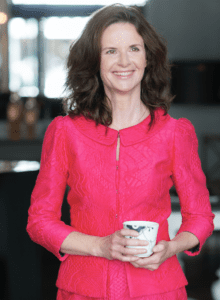In just a few weeks, I have moved myself and my two children from Nørrebro in Denmark to Cascais in Portugal.
It has been a huge project with so much involved: finding a new house, a new school, getting the old apartment sold, sorting, packing, and shipping our belongings, emptying an apartment of big and small things, getting it cleaned, closing a business and opening a new one, getting the new house furnished, getting gas, internet, and phones up and running, getting a local bank account, hiring a housekeeper, getting the new house cleaned and organized, and unpacking all the boxes.
How did I get it done? Alone with two children, and so fast?
I’ve realized that I have an operating system without knowing it. I have a certain way of doing things, and it’ actually pretty efficient.
Here are my key principles:
1. Write It Down
Between you and me: I love making lists.
When you write something down, it relieves the brain of the burden of trying to remember it.
The to-do list has a bad rep, but it should be honored.
Some people say it makes you focus on chasing your own tail because you focus on the amount of things that need to be done without prioritizing.
I say that no one can remember much in their head, so it’s important to get it all written down, and then you prioritize the tasks afterwards.
Here’s how I do it:
I write a large list on the first page of a notebook. I set aside pages so I can keep adding things to the “main list”.
I use the rest of the book for making daily lists. I make a new page every day. When I put the daily list together – which I do the night before so I can sleep peacefully – I make sure that there is at least one task that is important and high-priority.
2. Get Something Done Every Day
You need to move forward smoothly, and that’s why it’s important to get something done every day. As the saying goes: the way to eat an elephant is one bite at a time.
I actually used the same principle on an hourly schedule when I had to pack tons of boxes and later unpack the same boxes. It seems so unmanageable to stand in front of a mountain of 32 boxes.
I told myself just to take one box at a time and that it was okay that it was just one box for now. One box an hour would get me far in a few days.
3. Do the Hardest Thing First
My oldest son (8) has already learned this principle. He abhors having the nail on his little toe cut. That’s why he always asks me to cut it first, and I praise him every time for it. Doing it that way, it’s over fast, and he doesn’t have to dread it the rest of the time.
There are always some tasks that are fun, and some that are difficult. Most people tend to take on the easy task first. Instead, you need to go consciously after the worst task first, getting it out of your way so it doesn’t bother you the rest of the day.
4. Do the Little Things Right Away
“Just answer right away.”
My favorite professor at NYU told our class this. I no longer remember the context, but I remember the point.
If you can reply with a simple message to an email, reply immediately so it doesn’t become yet another item on your to-do list. It keeps the number of things on your list down.
For small things that take less than a minute to get done, just do them right away. Of course, you need to be a little mindful when checking emails so that you don’t constantly interrupt yourself.
In the relocation situation, this has meant that if I spotted something important that I could not forget to pack, I immediately went and put it in a box so that the thought would not bother me again and again.
5. Do It At the Right Time
Some tasks require you to be vigilant and sharp.
Do those tasks when you are vigilant and sharp.
I can’t write blog posts late at night. They turn out better if I write them early in the day. So, I’d rather go to bed early and set the alarm clock for 5 a.m. to get them written.
6. Delegate Tasks
I’m a single mom with no parents or family around, but I still get a lot of help from others.
Some are paid helpers and some are not.
I have an accountant and a lawyer in Portugal to help with the practicalities of getting a NIF (this is the kind of tax number you need to order or buy anything bigger than a pencil).
I hired someone to shut the old apartment down.
At the other end, I hired someone to open the new apartment and pick up and assemble the new furniture.
I also got help from friends.
A friend with a flair for decor made a giant IKEA shopping list for me. Another friend helped me empty the last of the things out of the apartment.
A third friend, who herself has lived in Portugal, flew in with us and helped keep track of the boys a little and helped me find my way to the nearest supermarket and back.
While she was here, I hired a cleaning assistant and a housekeeper.
7. Make Quick Decisions on Non-Essentials
Some decisions require careful consideration and analysis. Most decisions don’t.
Who to marry is a big decision, but where the first date takes place isn’t really that important. That’s the kind of decision you need to force yourself to make in less than a minute, because if you’re not careful, it will swallow hours of your time. Which country you want to move to is important, but which airline or moving company you choose is not.
In the investment world, it’s important to analyze what you want to invest in, but which platform you use is less important. I mention this because many actually get stuck there, which is silly.
In my process, this has meant that it took me 45 seconds to choose a name for the new companies that I opened, 20 seconds to choose a bank, 20 seconds to choose an ISP, and so on.
These are small decisions that you shouldn’t let drag on.
8. Get There Early
As I say to my oldest child: “the difference between leaving early and being late is the difference between being able to appreciate the birds chirping.”
When it’s a habit, it’s really the difference between being happy or not.
I can’t stand being late. It creates chaos, a foul mood, and it gives a bad first impression
Leave early, show up first, and be prepared.
This also applies when you have to finish packing or when you’re going to the airport.
Life is more fun and enjoyable when you give yourself enough time.
9. Keep it Simple
There are always several ways to do things, and I always ask myself which way is the most simple and straightforward.
It’s called “simple living.” Part of the philosophy is that you don’t have to have so many material things, and the ones you have, you don’t always have to own them.
I have chosen to live in a condominium, as they call it down here. It’s a guarded compound with a shared pool and garden.
This means that I don’t have to worry about taking care of a yard, caring for the pool, picking up packages (they can be delivered at the gate), driving my children to playdates (so far they have playdates with the other children in the same area, and they just run back and forth between the houses).
In the investment world, simple can mean having a buy-and-hold strategy so that you don’t have to constantly find new investments.
10. Get Help From the Best
This isn’t so much about delegating as it is about learning, taking advice, and imitating.
You shouldn’t listen to people who don’t have success in the field you want to master. Uncle Harry, who is deep in gambling debt, obviously has an attitude about what to invest in, and his eyes get a little big and greedy when he lectures you.
Aunt Jane who’s never lived abroad will tell you that you are selfish if you emigrate. She’ll tell you that it’s bad for the kids.
Instead of asking around randomly, seek advice from those who really know and have experience. Ask someone who lives in Portugal how their children are doing. Ask that person for practical advice to find a shortcut.
It’s your job to find the right advice and inspiration.
It pays to buy that kind of advice if you don’t know anyone in your circle.
If you want to learn about investing like Warren Buffett, you can download my investment book Free Yourself right here.


